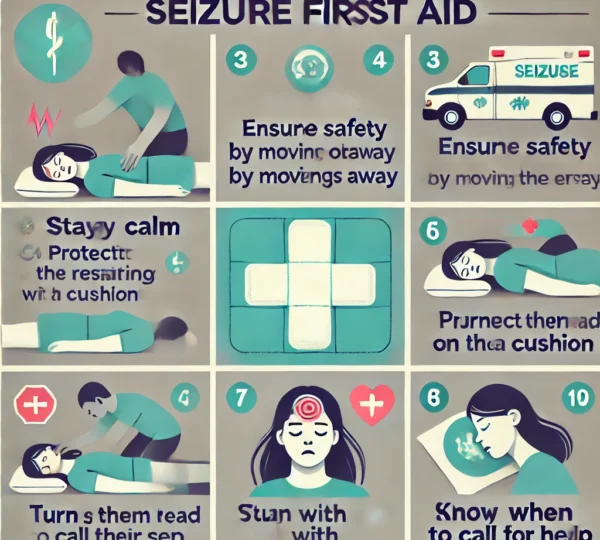Seizure First Aid: How to Assist Someone During a Seizure
Title: How to Help Someone During a Seizure: A Simple Guide
Description: Learn essential seizure first aid steps to keep someone safe during a seizure. Follow these tips for effective seizure assistance and support.
Introduction: Seizure First Aid Made Simple
Witnessing someone having a seizure can be overwhelming, but knowing the right steps to take can make a significant difference in ensuring their safety. Here’s a simple guide to help you provide effective seizure first aid and support the person during the event.
1. Stay Calm
It’s crucial to stay calm during a seizure. Most seizures last only a few minutes and usually end on their own. By staying composed, you can better assist the person. Keep track of the time to record the seizure’s duration, which will help medical professionals later.
2. Ensure Safety
Your first priority is to make sure the person is safe. Clear the area of sharp objects, furniture, or any obstacles that could cause injury. If necessary, gently guide the person away from potential hazards. Cushion their head with something soft, such as a folded towel or clothing, to prevent head injuries.
3. Do Not Restrain
Never try to restrain the person or hold them down during a seizure. Allow the seizure to run its course. Restraining the person can lead to injury, so focus on keeping them safe from any harm during the event.
4. Protect the Head
If the person is on the ground, gently turn them onto their side. This helps keep their airway clear and reduces the risk of choking. Place a soft object under their head to provide cushioning and prevent further injury.
5. Stay with Them
Remain with the person until the seizure ends and they regain full consciousness. Reassure them calmly and offer comfort once the seizure is over. Be patient and avoid crowding them with too many people, as this may cause unnecessary stress.
6. After the Seizure
Once the seizure ends, check the person for any injuries. They may be disoriented or confused, so give them time to recover. If the person isn’t fully conscious or if the seizure continues for longer than expected, seek medical help immediately.
7. Know When to Call for Help
Call emergency services if:
- The seizure lasts longer than 5 minutes.
- The person has difficulty breathing or turns blue.
- The person has multiple seizures without regaining consciousness.
- The person suffers injuries during the seizure.
By following these simple first aid steps, you can ensure the safety of someone experiencing a seizure and provide valuable support until medical help arrives.
To seek medical advice, always consult a Doctor. Here are our recommended experts. Click here
To read more on Epilepsy. Click Here



